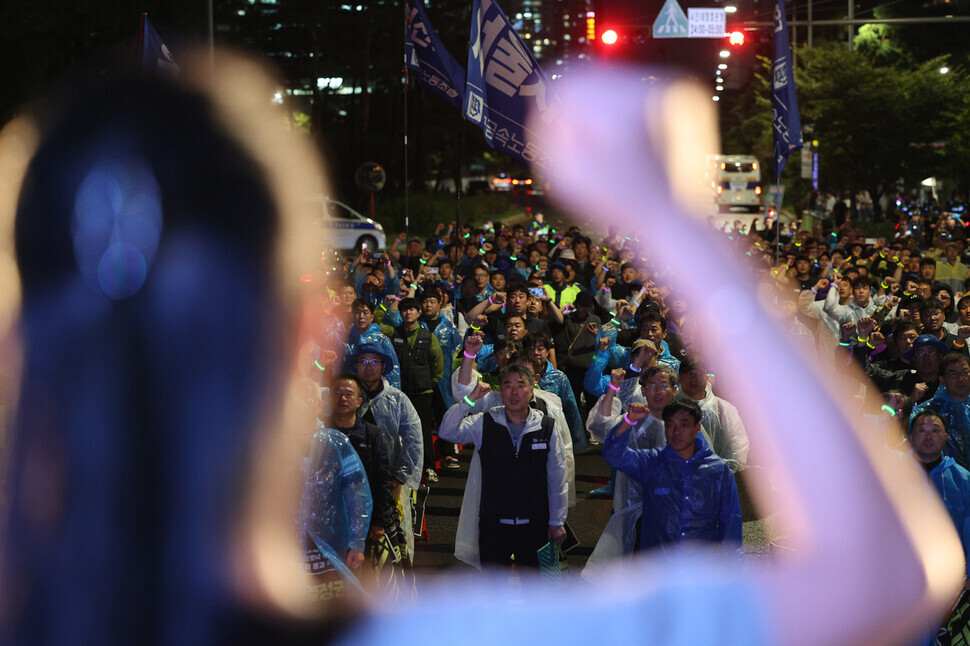hankyoreh
Links to other country sites 다른 나라 사이트 링크
Korea moves to ban late-night rallies in move criticized as circumventing courts

South Korea’s central government has announced that it will propose an amendment that would ban assemblies and demonstrations during late-night hours, defined as between 12 am and 6 am.
Coming after courts have repeatedly thwarted attempts by the police to quash rallies and protests, this move is being decried as an attempt by the government to curtail freedom of assembly by amending the law to circumvent the Constitution and court rulings.
On Thursday, Prime Minister Han Duck-soo held a meeting of ministers in which he announced the government would be pursuing a “plan to improve the culture of assemblies and demonstrations,” which includes amending the Assembly and Demonstration Act.
Han reasoned that “late-night assemblies and excessive noise violate people’s right to peace and quiet, and roadblocks during high-traffic hours cause a lot of inconvenience to the general public,” adding that “illegal assemblies and demonstrations consume a lot of police resources, which can be detrimental to their ability to maintain security.”
The government announced it would pursue amendments to eight pieces of legislation, including the Assembly and Demonstration Act and the Act on the Management of Outdoor Advertisements.
The amendments include a total ban on late-night assemblies, reinforcing noise regulations by strengthening methods of measuring noise, establishing a procedure for notifying the road management authorities of assemblies in advance, clarifying the criteria for judging assemblies and demonstrations on major roads such as rush hour, and increasing the penalties for damaging or infringing on police lines.
The police have decided to strengthen their response to assemblies and demonstrations too, regardless of any changes to the law.
From the stage of reporting a rally, the police will actively consider issuing restriction and prohibition notices, dispersal orders, and direct dispersal measures in case of non-compliance. Drone surveillance will be introduced for large-scale assemblies, and specialized assembly and demonstration investigation teams will be operated in areas where assemblies and marches are frequent.
The police also announced that they will actively seek compensation for material damages and personal damages to police officers caused by illegal acts during rallies.
Civic organizations are concerned about the detrimental effect these developments are likely to have on public assembly.
“Since dispositions are repeatedly blocked by the judiciary, the move intends to block judicial rulings through legislation,” commented Park Han-hee, an attorney who has represented several plaintiffs in lawsuits challenging the police’s issuance of dispositions.
“Even if the laws aren’t amended, this move is aimed at intimidating the public by insinuating that the mere act of joining an assembly can make you a criminal,” she said.
By Jang Na-rye, staff reporter; Kwak Jin-san, staff reporter
Please direct questions or comments to [english@hani.co.kr]

Editorial・opinion
![[Editorial] Intensifying US-China rivalry means Seoul must address uncertainty with Beijing sooner than later [Editorial] Intensifying US-China rivalry means Seoul must address uncertainty with Beijing sooner than later](https://flexible.img.hani.co.kr/flexible/normal/500/300/imgdb/original/2024/0517/8117159322045222.jpg) [Editorial] Intensifying US-China rivalry means Seoul must address uncertainty with Beijing sooner than later
[Editorial] Intensifying US-China rivalry means Seoul must address uncertainty with Beijing sooner than later![[Column] When ‘fairness’ means hate and violence [Column] When ‘fairness’ means hate and violence](https://flexible.img.hani.co.kr/flexible/normal/500/300/imgdb/original/2024/0516/7417158465908824.jpg) [Column] When ‘fairness’ means hate and violence
[Column] When ‘fairness’ means hate and violence- [Editorial] Yoon must stop abusing authority to shield himself from investigation
- [Column] US troop withdrawal from Korea could be the Acheson Line all over
- [Column] How to win back readers who’ve turned to YouTube for news
- [Column] Welcome to the president’s pity party
- [Editorial] Korea must respond firmly to Japan’s attempt to usurp Line
- [Editorial] Transfers of prosecutors investigating Korea’s first lady send chilling message
- [Column] Will Seoul’s ties with Moscow really recover on their own?
- [Column] Samsung’s ‘lost decade’ and Lee Jae-yong’s mismatched chopsticks
Most viewed articles
- 1[Editorial] Transfers of prosecutors investigating Korea’s first lady send chilling message
- 2For new generation of Chinese artists, discontent is disobedience
- 3S. Korea “monitoring developments” after report of secret Chinese police station in Seoul
- 4[Photo] 1,200 prospective teachers call death of teacher “social manslaughter”
- 5[Exclusive] Unearthed memo suggests Gwangju Uprising missing may have been cremated
- 6[Column] Samsung’s ‘lost decade’ and Lee Jae-yong’s mismatched chopsticks
- 7[Column] When ‘fairness’ means hate and violence
- 8Xi, Putin ‘oppose acts of military intimidation’ against N. Korea by US in joint statement
- 9[Special reportage- part I] Elderly prostitution at Jongmyo Park
- 10[News analysis] Samsung in management crisis due to owner risk